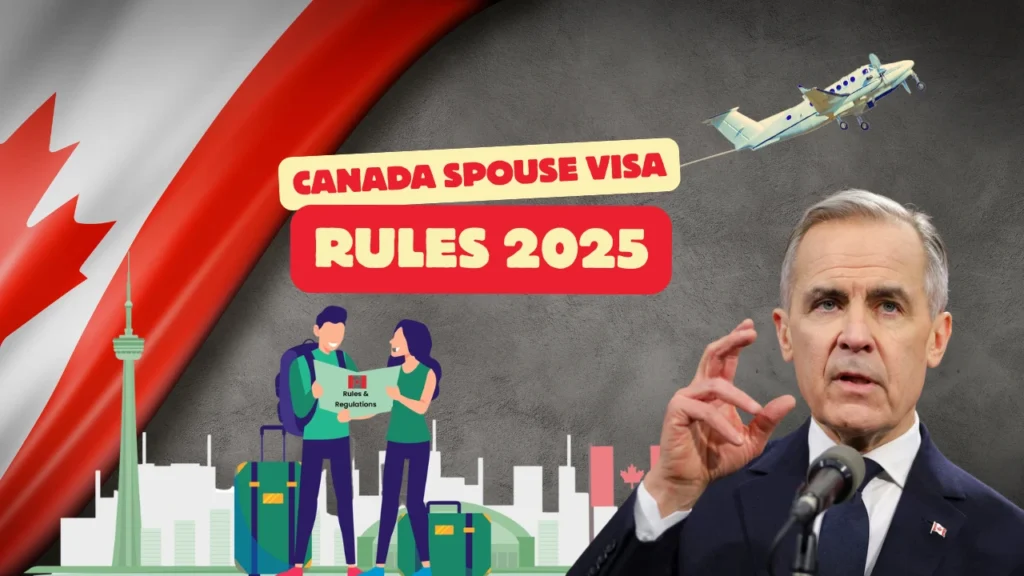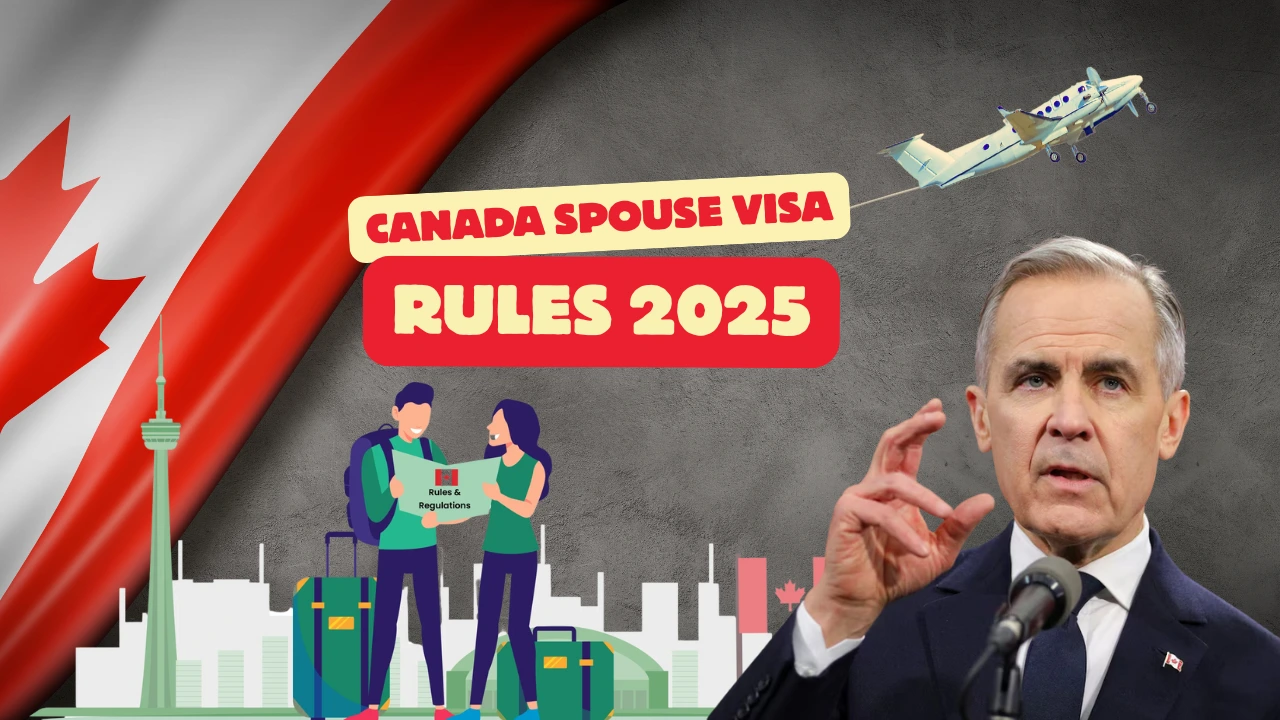Canada Spouse Visa New Rules 2025.The Spouse Visa Program allows Canadian citizens, permanent residents, and in certain cases temporary residents, to sponsor their partner for permanent residence or work authorization.
However, with the increasing number of international students, temporary workers, and new immigration priorities, Immigration, Refugees, and Citizenship Canada (IRCC) announced updated rules in January 2025. These changes directly affect eligibility, processing time, and documentation.
Overview of Canada Spouse Visa New Rules 2025
| Article on | Canada Spouse Visa New Rules 2025: Rule Changes, Processing Time & Updated Application Process |
| Eligibility | Restricted to spouses of skilled workers & advanced students |
| Work Permit | Only for spouses under TEER 0–3 jobs or master’s/PhD programs |
| Processing Time | 9–18 months depending on application type |
| Documentation | More detailed proof of relationship and financial ties |
| Biggest Change | Spouses of most international students no longer qualify |
Why the Rules Changed in 2025
The new rules came into effect on January 21, 2025, to control the rising number of temporary residents and align immigration policies with labor market needs. Under older rules, many applicants could apply with minimal restrictions, leading to backlogs and eligibility issues. Key reasons for the update are as given below with the help of bullet points:

- Balancing temporary resident numbers with permanent immigration targets
- Ensuring genuine relationships are prioritized.
- Addressing labor market gaps by linking work permits to specific occupations under the TEER system.
Major Rule Changes in Canada Spouse Visa 2025
The 2025 update has introduced both eligibility restrictions and new documentation requirements. A simplified comparison of the old rules and the 2025 updates is as given below with the help of table:
| Category | Old Rules (Before 2025) | New Rules (From Jan 2025) |
| Eligibility | Almost all international students & workers could apply for spousal work permits. | Only spouses of specific worker categories (TEER 0–3 jobs, advanced academic streams) are eligible. |
| Documentation | Basic relationship proof and ID. | Mandatory expanded evidence of cohabitation, financial support, and intent to live together. |
| Processing | Average 6–9 months. | Streamlined but with priority for high-demand worker categories; average 9–12 months. |
| Work Authorization | Spousal Open Work Permit widely available. | Restricted; only spouses of full-time workers in eligible categories qualify. |
| Temporary Residents | Easier to apply while on a student visa. | Stricter verification; many student spouses no longer qualify. |
Processing Time in 2025
Processing times have been extended slightly due to stricter checks.
- Spousal Open Work Permit (SOWP): 9–12 months.
- Permanent Residence Sponsorship: 12–18 months depending on applicant category.
- Applications from outside Canada: Often take longer compared to inland applications.
Here is a quick breakdown of timelines for 2025:
| Application Type | Average Processing Time |
| Inland Sponsorship (PR) | 12–15 months |
| Outland Sponsorship (PR) | 15–18 months |
| Spousal Open Work Permit | 9–12 months |
Impact on International Students and Temporary Workers
One of the most significant changes in 2025 is the reduction of eligibility for spouses of international students.
- Only students in master’s, doctoral, and specific professional programs can sponsor spouses for work permits.
- Spouses of students in short-term diplomas, language programs, or low-skill jobs are no longer eligible.
- This change has been introduced to reduce pressure on the housing market and ensure that incoming spouses can contribute meaningfully to Canada’s labor force
Required Documents in 2025
IRCC has added stricter documentation requirements to reduce fraudulent applications.
| Document | Purpose |
| Marriage or Common-law certificate | Proof of legal relationship. |
| Joint financial documents (bank statements, lease agreements) | Proof of shared life. |
| Photos of couple together (with family, trips) | Evidence of genuine relationships. |
| Sponsor’s employment/education documents | Confirms eligibility under TEER categories. |
| Medical exam & biometrics | Security and health clearance. |
Common Challenges Under New Rules
Applicants may face hurdles such as:
- Eligibility restrictions for student spouses.
- Longer wait times compared to past years.
- Increased document scrutiny leading to rejections if incomplete.
- Limited work authorization, affecting families financially during waiting periods.
Practical Tips for Applicants in 2025
- Double-check eligibility before applying to save time and money.
- Submit organized documents with clear translations (if needed).
- Consider hiring a regulated immigration consultant (RCIC) for complex cases.
- Apply as early as possible, since processing times are increasing.
- Stay updated through IRCC’s official announcements.
Final Thoughts
The Canada Spouse Visa New Rules 2025 mark a significant shift in how couples can reunite in Canada. With stricter eligibility, detailed documentation, and longer processing times, applicants must be well-prepared. While the process may feel more demanding,
genuine couples with strong applications still have a clear path to live and work together in Canada. Staying updated with IRCC’s latest announcements and preparing thoroughly will help ensure a smoother application journey.
FAQs for Canada Spouse Visa New Rules 2025
Can all international student spouses apply for a work permit in 2025?
No, only spouses of students in master’s, doctoral, and specific high-demand programs are eligible.
Do I need to provide photos with my application?
Yes, photos of you and your spouse together are now a key proof of a genuine relationship.
Is the Spousal Open Work Permit still available?
Yes, but only for spouses of full-time workers and advanced students in eligible categories.
What is the biggest reason applications get refused in 2025?
Incomplete documentation or ineligibility under the new TEER-based system.
